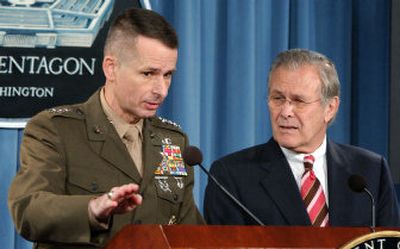Rumsfeld unmoved as resignation calls grow

WASHINGTON – If calls by retired generals for his resignation disturb Defense Secretary Donald Rumsfeld, he wasn’t showing it Tuesday.
“No,” Rumsfeld replied sternly when asked in a Pentagon briefing if the critics were affecting his ability to do his job.
“When you’re involved in something that’s controversial, as certainly this war is, one ought to expect that,” he said. “It’s historic, it’s always been the case, and I see nothing really very new or surprising about it.”
Others see it as remarkable that yet another top officer, retired Marine Lt. Gen. Gregory Newbold, former operations director for the Pentagon’s Joint Staff, has publicly urged his former boss to resign over his handling of the Iraq war.
Newbold’s essay in Time magazine, published Sunday, follows similar calls by retired Marine Gen. Anthony Zinni, former head of U.S. Central Command, and retired Army Maj. Gen. Paul Eaton, who ran the training of Iraqi troops in 2003-04.
Daniel Goure of the Lexington Institute, a think tank in close contact with top officers, said it was “an extraordinarily unusual event in the middle of a war to find not one, not two, but a virtual regiment of former senior military leaders criticizing many aspects of the secretary’s conduct of the war.”
The critics contend Rumsfeld pushed for an unnecessary war, insisted on using too few troops to secure Iraq and reacted slowly to the insurgency that still roils the country. They also take issue with his domineering style.
Rumsfeld “doesn’t pay too much attention to it, he really does not,” said Lawrence Di Rita, one of his top advisers. “People have books they need to sell and they have articles they like to write. Everybody’s entitled to their views.”
The secretary has shrugged off demands for his head from politicians for years.
Like Bush’s, Rumsfeld’s approval rating in opinion polls has flagged as public support for the war has weakened, hovering around 42-44 percent in surveys by various organizations late last year and early this year – about 20 points lower than four years ago.
Bush continues to express confidence in Rumsfeld. And when asked last month about demands he step down, Rumsfeld said that “the president has asked me not to get involved in politics, and that’s politics.”
The latest criticism, however, comes from former officers with no obvious political motives, though Zinni has offered his views on Rumsfeld during interviews to promote a new book.
Rumsfeld should go, Zinni told National Public Radio last week, partly as “accountability” for mistakes made in Iraq but also “to move forward with a new face, not find ourselves constantly defending the past.”
Eaton, in a New York Times commentary, said Rumsfeld “has shown himself incompetent strategically, operationally and tactically, and is far more than anyone else responsible for what has happened to our important mission in Iraq.”
Newbold said U.S. forces were committed to Iraq “with a casualness and swagger that are the special province of those who have never had to execute these missions – or bury the results.”
Military leaders in the Pentagon “know the hard consequences of war but, with few exceptions, acted timidly when their voices urgently needed to be heard,” Newbold added.
Eaton also said Rumsfeld has “intimidated” top officers – including Marine Gen. Peter Pace, the chairman of the Joint Chiefs of Staff – and inspired “a growing reluctance by experienced military men and civilians to challenge the notions of the senior leadership.”
Pace took the rare step in Tuesday’s briefing of raising the issue of Rumsfeld’s role before reporters did.
The plans for the Iraq invasion were hammered out in dozens of meetings with the field commander, Army Gen. Tommy Franks, Pace said, and many tough questions were asked. In the end, the Joint Chiefs assured the president the plan was sound, he said.